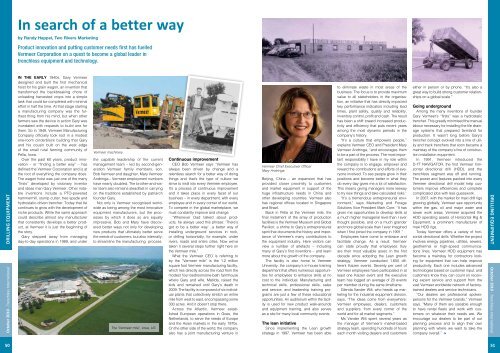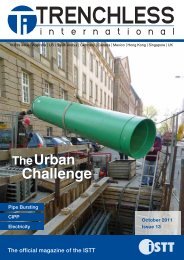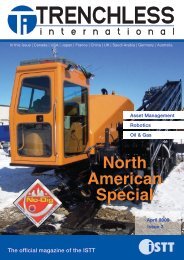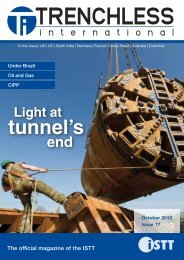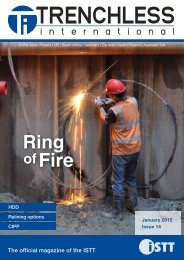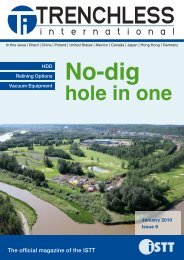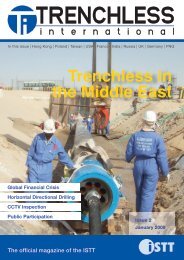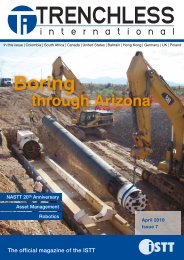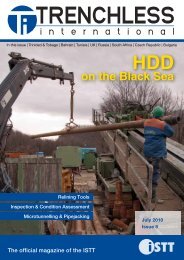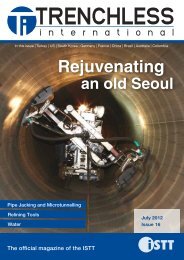Singapore - Trenchless International
Singapore - Trenchless International
Singapore - Trenchless International
Create successful ePaper yourself
Turn your PDF publications into a flip-book with our unique Google optimized e-Paper software.
dRILLING eqUIPMeNt<br />
October 2010 - <strong>Trenchless</strong> <strong>International</strong><br />
50<br />
In search of a better way<br />
by Randy Happel, Two Rivers Marketing<br />
Product innovation and putting customer needs first has fuelled<br />
Vermeer Corporation on a quest to become a global leader in<br />
trenchless equipment and technology.<br />
IN The earLy 1940s, Gary Vermeer<br />
designed and built the first mechanical<br />
hoist for his grain wagon, an invention that<br />
transformed the backbreaking chore of<br />
unloading harvested crops into a simple<br />
task that could be completed with minimal<br />
effort in half the time. At that stage starting<br />
a manufacturing company was the furthest<br />
thing from his mind, but when other<br />
farmers saw the device in action Gary was<br />
inundated with requests to build one for<br />
them. so in 1948, Vermeer Manufacturing<br />
Company officially took root in a modest<br />
one-room cinderblock building that Gary<br />
and his cousin built on the west edge<br />
of the small rural farming community of<br />
Pella, Iowa.<br />
Over the past 60 years, product innovation<br />
– or “finding a better way” – has<br />
defined the Vermeer Corporation and is at<br />
the root of everything the company does.<br />
the wagon hoist was just one of the many<br />
“firsts” developed by visionary inventor<br />
and ideas man Gary Vermeer. Other notable<br />
inventions include a PtO-powered<br />
hammermill, stump cutter, tree spade and<br />
hydrostatic-driven trencher. today that list<br />
continues to grow with the development of<br />
niche products. While the same approach<br />
could describe almost any manufacturer<br />
that consistently develops a better product,<br />
at Vermeer it is just the beginning of<br />
the story.<br />
Gary stepped away from managing<br />
day-to-day operations in 1989, and under<br />
Vermeer machinery.<br />
the capable leadership of the current<br />
management team – led by second-generation<br />
Vermeer family members, son,<br />
Bob Vermeer and daughter, Mary Vermeer<br />
Andringa – Vermeer employment numbers<br />
have nearly doubled. the brother-and-sister<br />
team also remains steadfast in carrying<br />
on the traditions established by patriarch<br />
founder Gary.<br />
Not only is Vermeer recognised worldwide<br />
as being among the most innovative<br />
equipment manufacturers, but the processes<br />
by which it does so are equally<br />
impressive. Bob and Mary have discovered<br />
better ways not only for developing<br />
new products that ultimately better serve<br />
the needs of customers, but also internally,<br />
to streamline the manufacturing process.<br />
The "Vermeer mile", Iowa, US.<br />
continuous improvement<br />
CEO Bob Vermeer says “Vermeer has<br />
always been driven by change and a<br />
relentless search for a better way of doing<br />
things and that’s the type of culture we<br />
strive to instil into every Vermeer employee.<br />
It’s a process of continuous improvement<br />
and it takes place in every facet of our<br />
business – in every department, with every<br />
employee and in every corner of our world.<br />
to compete in the global marketplace, we<br />
must constantly improve and change.<br />
“Whenever Dad talked about products,<br />
he always used this phrase: ‘there’s<br />
got to be a better way’…a better way of<br />
installing underground services in rock,<br />
or drilling horizontally, for example, under<br />
rivers, roads and entire cities. Now we’ve<br />
taken it several steps further right here on<br />
the Vermeer mile.”<br />
What the Vermeer CEO is referring to<br />
by the “Vermeer mile” is the 1.2 million<br />
square foot Vermeer manufacturing facility,<br />
which lies directly across the road from the<br />
modest four-bedroom/one-bath farmhouse<br />
where Gary and wife, Matilda, raised the<br />
kids and remained until Gary’s death in<br />
2009. the facility is composed of six individual<br />
plants that collectively stretch an entire<br />
mile from west to east, encompassing some<br />
330 acres. And it doesn’t stop there.<br />
Across the Atlantic, Vermeer established<br />
European operations in Goes, the<br />
Netherlands, to serve the needs of Europe<br />
and the Asian markets in the early 1970s.<br />
On the other side of the world, the company<br />
also has a joint manufacturing venture in<br />
Vermeer Chief Executiver Officer<br />
Mary Andringa.<br />
Beijing, China – an expansion that has<br />
provided closer proximity to customers<br />
and market equipment in support of the<br />
huge infrastructure needs in China and<br />
other developing countries. Vermeer also<br />
has regional offices located in singapore<br />
and Brazil.<br />
Back in Pella at the Vermeer mile, the<br />
final instalment of the array of production<br />
facilities is the Vermeer Museum and Global<br />
Pavilion; a shrine to Gary’s entrepreneurial<br />
spirit that documents the history and importance<br />
of Vermeer’s many contributions to<br />
the equipment industry. Here visitors can<br />
view a number of artefacts – including<br />
many of Gary’s first inventions – and learn<br />
more about the growth of the company.<br />
the facility is also home to Vermeer<br />
University, the company’s in-house training<br />
department that offers numerous opportunities<br />
for employees to enhance skills at no<br />
cost to the individual. Manufacturing and<br />
technical skills, professional skills, sales<br />
and service, and leadership training programs<br />
are just a few of these educational<br />
opportunities. An auditorium within the facility<br />
is used for new product walk-arounds<br />
and equipment training, and also serves<br />
as a site for many local community events.<br />
The lean initiative<br />
since implementing the Lean growth<br />
strategy in 1997, Vermeer has been able<br />
to eliminate waste in most areas of the<br />
business. the focus is to provide maximum<br />
value to all stakeholders in the organisation,<br />
an initiative that has directly impacted<br />
key performance indicators including lead<br />
times, plant safety, quality and reliability,<br />
inventory control, profit and cash. the result<br />
has been a shift toward increased productivity<br />
and efficiency that puts recent years<br />
among the most dynamic periods in the<br />
company’s history.<br />
“It’s a culture that empowers people,”<br />
explains Vermeer CEO and President Mary<br />
Vermeer Andringa, “and encourages them<br />
to be a part of the process. the most important<br />
responsibility I have in my role within<br />
the company is to engage, empower and<br />
reward the contributions and efforts of everyone<br />
involved. to see people grow in their<br />
positions and become better in what they<br />
do every day gives me a lot of satisfaction.<br />
this means giving managers more leeway<br />
to try new things and take calculated risks.”<br />
“It’s a tremendous entrepreneurial environment,”<br />
says Marketing and Forage<br />
solutions Vice President Mark Core. “It has<br />
given me opportunities to develop skills at<br />
a much higher managerial level than I ever<br />
thought possible, and on a much grander<br />
and more global scale than I ever imagined<br />
when I first joined the company in 1991.”<br />
Employees have come to embrace and<br />
facilitate change. As a result, Vermeer<br />
can state proudly that employees truly<br />
are their most valuable asset. In the first<br />
decade since adopting the Lean growth<br />
strategy, Vermeer conducted 1,600 different<br />
Kaizen events. seventy per cent of<br />
Vermeer employees have participated in at<br />
least one Kaizen event and the executive<br />
team has logged an average of 20 events<br />
per member during the same timeframe.<br />
Glenda Vander Wilt, who heads up marketing<br />
for the industrial equipment division,<br />
says, “the ideas come from everywhere:<br />
Vermeer employees, dealers, customers<br />
and suppliers, from every corner of the<br />
world and for all market segments.”<br />
Ms Vander Wilt spent several years as<br />
the manager of Vermeer’s market-based<br />
strategy team, spending hundreds of hours<br />
each month visiting dealers and customers<br />
either in person or by phone. “It’s also a<br />
great way to build strong customer relationships<br />
on a global scale.”<br />
Going underground<br />
Among the many inventions of founder<br />
Gary Vermeer’s “firsts” was a hydrostatic<br />
trencher. this greatly minimised the manual<br />
labour necessary for installing the tile drainage<br />
systems that prepared farmland for<br />
production. It wasn’t long before Gary’s<br />
trencher concept evolved into a line of utility<br />
and track trenchers that soon became a<br />
mainstay of the company’s line of construction<br />
installation equipment.<br />
In 1991, Vermeer introduced the<br />
D-7t NAVIGAtOR, the first Vermeer horizontal<br />
directional drill (HDD), and the<br />
trenchless segment was off and running.<br />
the power and features packed into every<br />
Vermeer directional drill model help customers<br />
improve efficiencies and complete<br />
complicated jobs with less guesswork.<br />
In 2007, with the market for maxi drill rigs<br />
growing globally, Vermeer saw opportunity<br />
within the gas, oil and major water and<br />
sewer work areas. Vermeer acquired the<br />
HDD operating assets of Horizontal Rig &<br />
Equipment, a prominent manufacturer of<br />
maxi HDD rigs.<br />
today Vermeer offers a variety of horizontal<br />
directional drills. Whether the project<br />
involves energy pipelines, utilities, sewers,<br />
geothermal or high-speed communications<br />
lines, Vermeer HDD equipment has<br />
become a mainstay for contractors looking<br />
for equipment that can help improve<br />
productivity. Each one includes advanced<br />
technologies based on customer input, and<br />
customers know they can count on receiving<br />
expert service and support from the<br />
vast Vermeer worldwide network of factorytrained<br />
dealers and service technicians.<br />
“Our dealers are professional spokespersons<br />
for the Vermeer brands,” Vermeer<br />
says. “Many of them are sizeable enough<br />
to have rental fleets and work with customers<br />
on whatever their needs are. We<br />
encourage our dealers to be part of our<br />
planning process and to align their own<br />
planning with where we want to take the<br />
company overall.”<br />
dRILLING eqUIPMeNt<br />
October 2010 - <strong>Trenchless</strong> <strong>Trenchless</strong> <strong>International</strong> 51


